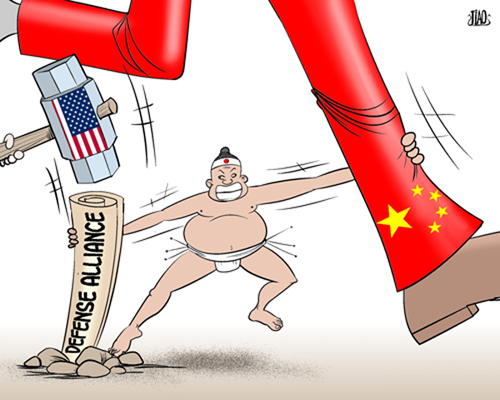US Senate takes fateful step
- By Zhao Jinglun
 0 Comment(s)
0 Comment(s) Print
Print E-mail China.org.cn, December 11, 2012
E-mail China.org.cn, December 11, 2012
On November 29, 2012, the US Senate approved an amendment to the National Defense Authorization Act for fiscal year 2013. Under that amendment, the disputed Diaoyu (Senkaku) Islands are officially put under the protection of the US-Japan Cooperation and Security Treaty.
|
|
|
Stretched allegiances [By Jiao Haiyang/China.org.cn] |
The purpose of the Defense Authorization Act is to specify a budget and expenditures for the Defense Department. It is unusual for it to actually mention territorial disputes between other nations. The conservative right-wing in the Senate did this unusual to boost the already-brazen Japanese Right. It worsens an already dangerous situation and could provoke a military conflict that neither the United States or China wants.
The amendment, to be sure, needs to be approved by the House and signed by President Obama. But its chances to become law must be taken seriously.
The United States is behind the island dispute in the first place. The Chinese first discovered and named the Diaoyu Islands. Japan grabbed them only after defeating the Qing court in the Sino-Japanese War of 1895. After WW II, Japan as the defeated aggressor, was required by both the Cairo Declaration and Potsdam Proclamation to surrender territories obtained from aggression and revert to their pre-1895 legal status. Instead, at the San Francisco Treaty of 1951, at which China was not invited as a signatory, the US received administrative rights over the Diaoyu Islands and later transferred those rights to Japan. China never recognized that illicit transfer.
The dispute flared up when Japanese Prime Minister Yoshihiko Noda "nationalized" the islands with US acquiescence. The US time and again declared it "takes no position" on the ultimate sovereignty of the territory. Then came the declaration that article 5 of the US-Japan Security Pact applies to the Diaoyu Islands. First by Secretary of State Hillary R. Clinton, not through her own but through the mouth of her Japanese counterpart.
Now the US Senate is trying to make it a law of the land that must be followed. Who are the sponsors? First is Jim Webb of Virginia, former Secretary of the Navy. He was supported by three other Senators: James Inhofe of Oklahoma, one of 38 Republican senators who shamefully voted against the UN Treaty on the Rights of the Disabled. Joe Lieberman of Connecticut, the pro-Israel super hawk who was a Democrat but became Independent and supported the Republican candidate McCain against Obama during the 2008 presidential elections. And John McCain of Arizona himself, regarded as a "war hero". He was shot down over Vietnam and spent five years in "Hanoi Hilton". There was no war that he and his pal Republican Senator Lindsey Graham of South Carolina did not like.
Why did they do this? The United States, an established power, does not know how to handle China, a rising power. So it stirs up conflicts between China and its neighbors to create a tense situation that might hold back China's explosive growth. But playing with fire is dangerous. Low intensity conflicts can intensify and get out of control. So how far will the US go?
The US wants to reward Japan for doing the dirty work on its behalf. But the rise of Japan's right-wing threatens not only China, but peace in the region and the entire world. Has the US forgotten Pearl Harbor and the Bataan death march? The notorious rightist Ishihara Shintaro is not only against China, he also wanted to throw the United States out of Japan.
The other rightists are no less dangerous.
The author is a columnist with China.org.cn. For more information please visit: http://www.china.org.cn/opinion/zhaojinglun.htm
Opinion articles reflect the views of their authors, not necessarily those of China.org.cn.







Go to Forum >>0 Comment(s)